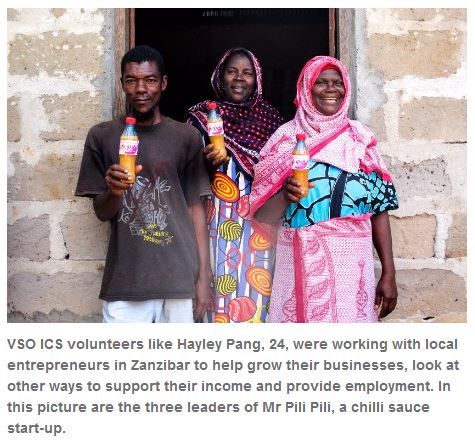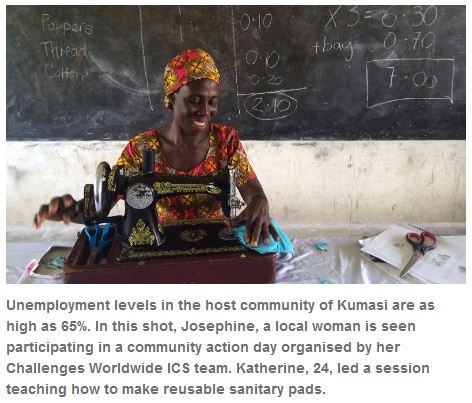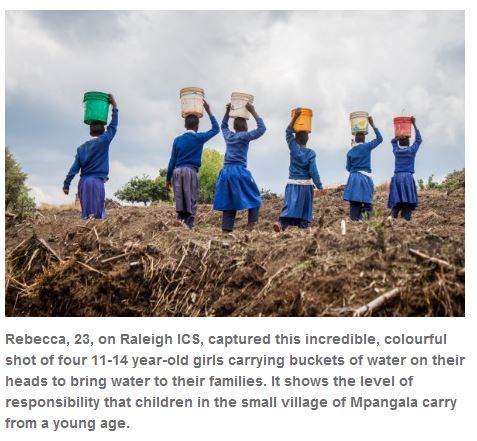ICS – tackling poverty through volunteering
By Denise Nanni and Milena Rampoldi, ProMosaik.
International Citizen Service (ICS) is an
international volunteering programme for people aged 18-25, funded by the UK
Government. It’s led by the international development organisation VSO, who have over
50 years of experience tackling poverty through volunteering.
International Citizen Service (ICS) is an
international volunteering programme for people aged 18-25, funded by the UK
Government. It’s led by the international development organisation VSO, who have over
50 years of experience tackling poverty through volunteering.

ICS volunteers from the UK and developing countries work side by side
on projects to improve health, education, livelihoods, rights and environmental
sustainability in 19 countries in Africa, Asia and Latin America.
on projects to improve health, education, livelihoods, rights and environmental
sustainability in 19 countries in Africa, Asia and Latin America.
Alongside running the ICS programme for youth volunteers from the UK
and developing countries, VSO also runs longer term volunteering programmes for
professionals, including those with a health, education and business background
from around the world.
and developing countries, VSO also runs longer term volunteering programmes for
professionals, including those with a health, education and business background
from around the world.
We asked Felicity Morgan, Director of ICS at VSO, about the programme
and volunteering to end poverty.
and volunteering to end poverty.
How was International Citizen Service (ICS) founded?
David Cameron, then British Prime Minister, announced the launch of
ICS in October 2010, as a programme to harness young people’s passion for
change in the effort to tackle poverty, funded by UK aid.
ICS in October 2010, as a programme to harness young people’s passion for
change in the effort to tackle poverty, funded by UK aid.
ICS offers young people from the UK and developing countries the
chance to contribute to sustainable, well planned development programmes.
chance to contribute to sustainable, well planned development programmes.
The first ICS volunteers begun their placements in summer 2011, and
since then more than 24,000 volunteers have made an incredible difference over
three continents.
since then more than 24,000 volunteers have made an incredible difference over
three continents.

What is the value that volunteering brings to society?
People sharing their knowledge, skills and energy with others makes a
huge difference. It’s a powerful, practical and sustainable way to tackle
poverty and inequality.
huge difference. It’s a powerful, practical and sustainable way to tackle
poverty and inequality.
VSO carried out research with
the Institute of Development Studies (IDS), titled ‘Valuing
Volunteering’, which revealed just how and
why volunteering is so important in the global effort to end poverty.
the Institute of Development Studies (IDS), titled ‘Valuing
Volunteering’, which revealed just how and
why volunteering is so important in the global effort to end poverty.
Volunteering extends the reach of public services to the poorest and
most marginalised, since volunteers can reach places and people that others
can’t.
most marginalised, since volunteers can reach places and people that others
can’t.
It also drives innovation, meaning new solutions become available
which improve people’s lives. Exposure to people from
different cultural contexts can make individuals more reflective of their own
culture, and can be a powerful driver of change long after volunteers have
left.
which improve people’s lives. Exposure to people from
different cultural contexts can make individuals more reflective of their own
culture, and can be a powerful driver of change long after volunteers have
left.
The research also found that because they are embedded within
communities and organisations, volunteers are able to forge strong personal and
professional relationships. This builds trust and solidarity, which are
important requisites for change.
communities and organisations, volunteers are able to forge strong personal and
professional relationships. This builds trust and solidarity, which are
important requisites for change.
At VSO, we see this in both our long-term
professional volunteer placements, which last between one and two years, and
our ICS youth placements, which last three months.
professional volunteer placements, which last between one and two years, and
our ICS youth placements, which last three months.
How do you identify the communities that will receive your volunteers?
We work in some of the worlds poorest and most marginalised
communities where they have specifically requested our help and also where we
believe we can have a positive, sustainable impact.
communities where they have specifically requested our help and also where we
believe we can have a positive, sustainable impact.
In our ICS projects, we value the unique contribution of younger
volunteers – their ability to engage with other young people in the communities
where they are based and to drive the community to be part of the change they
want to see.
volunteers – their ability to engage with other young people in the communities
where they are based and to drive the community to be part of the change they
want to see.
We work with local partner organisations to develop project plans that
closely reflect the needs of the community, and are likely to bring about the
most impact.
closely reflect the needs of the community, and are likely to bring about the
most impact.
In VSO’s professional placements, our partner organisations let us
know what skills they need and we match up volunteers with the placements in
which they are most likely to have a significant and long-lasting impact.
know what skills they need and we match up volunteers with the placements in
which they are most likely to have a significant and long-lasting impact.
Through this way of working, the community benefit from skills and
knowledge, and have a greater ownership of the projects and programmes because
of the personal contact with the volunteers.
knowledge, and have a greater ownership of the projects and programmes because
of the personal contact with the volunteers.

In which kind of projects are they involved?
ICS volunteers work on projects that achieve
real change – providing clean water and sanitation, helping prevent HIV
infection, making sure girls get the chance to go to school, and helping people
provide a better income for themselves and their families.
real change – providing clean water and sanitation, helping prevent HIV
infection, making sure girls get the chance to go to school, and helping people
provide a better income for themselves and their families.
We work with seven other international development organisations to
deliver ICS, and each agency has a particular area of expertise. Some focus on
enterprise and development through business, while others focus on human
rights, or sustainability and access to sanitation and water. Each of our
partners plays a particular role in delivering ICS and making it a success.
deliver ICS, and each agency has a particular area of expertise. Some focus on
enterprise and development through business, while others focus on human
rights, or sustainability and access to sanitation and water. Each of our
partners plays a particular role in delivering ICS and making it a success.
No two placements are the same, but they are all part of wider longer
term sustainable development programmes and are properly planned to bring about
lasting change.
term sustainable development programmes and are properly planned to bring about
lasting change.
VSO’s professional volunteers share their skills and experience across
Africa, Asia and the Pacific regions, focusing on health, education and
livelihoods, working with individuals and organisations at all levels of
society.
Africa, Asia and the Pacific regions, focusing on health, education and
livelihoods, working with individuals and organisations at all levels of
society.
VSO volunteers can be doctors training staff at rural health clinics
in Sierra Leone, or teachers working with the Nepali Ministry of Education to
make sure vulnerable girls go to school – they work in more than 20 countries
on projects like these, and many more.
in Sierra Leone, or teachers working with the Nepali Ministry of Education to
make sure vulnerable girls go to school – they work in more than 20 countries
on projects like these, and many more.
What is Action at Home?
When our ICS youth volunteers come home they
become part of our ICS alumni network, which is now over 24,000 strong. All ICS
volunteers complete an Action at Home project, which is some kind of positive
social action in their local community, whether that be in the UK or in the
developing country that they are from.
become part of our ICS alumni network, which is now over 24,000 strong. All ICS
volunteers complete an Action at Home project, which is some kind of positive
social action in their local community, whether that be in the UK or in the
developing country that they are from.
This could be visiting a local school to speak
about ICS and the global effort to end poverty, volunteering with a local
charity or meeting with their elected representative to advocate for positive
change.
about ICS and the global effort to end poverty, volunteering with a local
charity or meeting with their elected representative to advocate for positive
change.
The positive action that arise from ICS through
Action at Home and lasting civic engagement are something we’re really proud
of. Young people have applied their knowledge to develop activities in their
own communities, attend UN General Assembly meetings and mentor other young
people to begin their own journey.
Action at Home and lasting civic engagement are something we’re really proud
of. Young people have applied their knowledge to develop activities in their
own communities, attend UN General Assembly meetings and mentor other young
people to begin their own journey.
Action at Home is a really important part of
ICS, and we make sure all our volunteers know that their ICS experience doesn’t
end when they get home.
ICS, and we make sure all our volunteers know that their ICS experience doesn’t
end when they get home.
For more information about ICS visit www.volunteerics.org. For more
information about VSO visit www.vsointernational.org.
information about VSO visit www.vsointernational.org.


